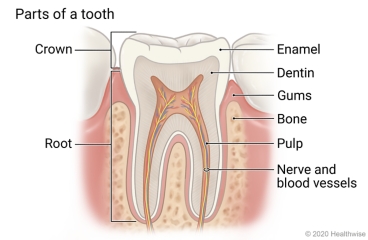
What do your teeth do?
Your teeth let you bite and chew food.
Teeth have different parts. The part you can see is called the crown. The root of the tooth holds the tooth in place. Your gums and bone surround the root.
The hard white cover of a tooth is called enamel. Under the enamel are the dentin and pulp.
Each tooth has a different role. For example, one type of tooth, an incisor, can cut food, while another type, a molar, grinds food.
Teeth also can be important to speech. For example, to make a "th" sound, you must touch your front teeth with your tongue.
What problems can happen with your teeth?
Tooth decay can cause pain (toothache), small holes (cavities), infection (such as an abscess), and tooth loss. This decay is caused by plaque, a thin film of bacteria that sticks to the teeth above and below the gum line. Tartar is a hard buildup of plaque. Plaque and tartar use sugars in food to make acids that eat away at teeth.
Gum disease is inflammation or infection of the tissues and bones that surround and support the teeth. Many things can cause it, including the growth of plaque under the gums. Gum disease can cause red, swollen gums that bleed when you brush your teeth. It can lead to loose teeth and tooth loss.
Stains on the teeth can be caused by food, drink, and tobacco use.
Also, teeth can be chipped, broken, or knocked out during sports, an accident, or a bad fall.
How can you prevent tooth problems?
- Every day, brush your teeth in the morning and at night, and floss once a day. This removes plaque and keeps it from hardening into tartar.
- Use a toothpaste that contains fluoride, which helps prevent tooth decay and cavities. Look for toothpastes that have been approved by the American Dental Association.
- Ask your dentist if you need to use a mouthwash that contains fluoride or one with ingredients that fight plaque.
- Avoid foods that contain a lot of sugar.
- Clean your tongue when you brush your teeth. You can use a tongue cleaner or a soft-bristle toothbrush, stroking in a back-to-front direction.
- Schedule checkups and cleanings as often as your dentist recommends it.
- Avoid using tobacco products, which can cause bad breath, gum disease, and oral cancer.
Where can you learn more?
Go to http://www.healthwise.net/patientEd
Enter I656 in the search box to learn more about "Learning About Your Teeth".
Current as of: October 27, 2024
Author: Ignite Healthwise, LLC Staff
Clinical Review Board
All Healthwise education is reviewed by a team that includes physicians, nurses, advanced practitioners, registered dieticians, and other healthcare professionals.

